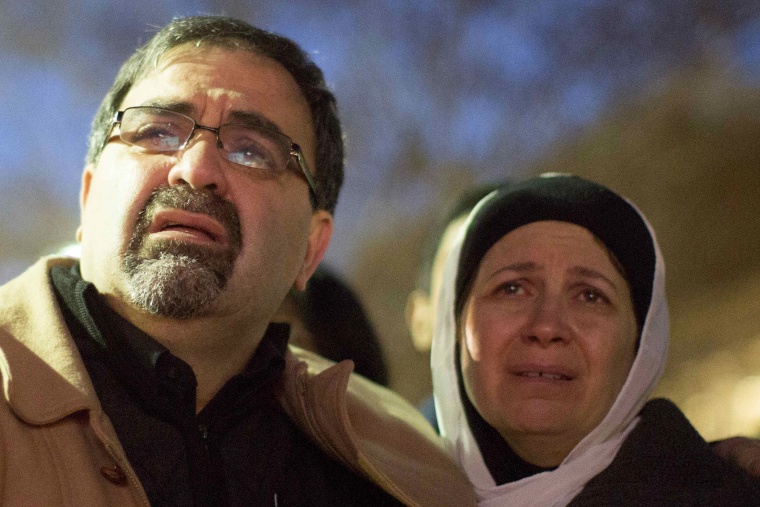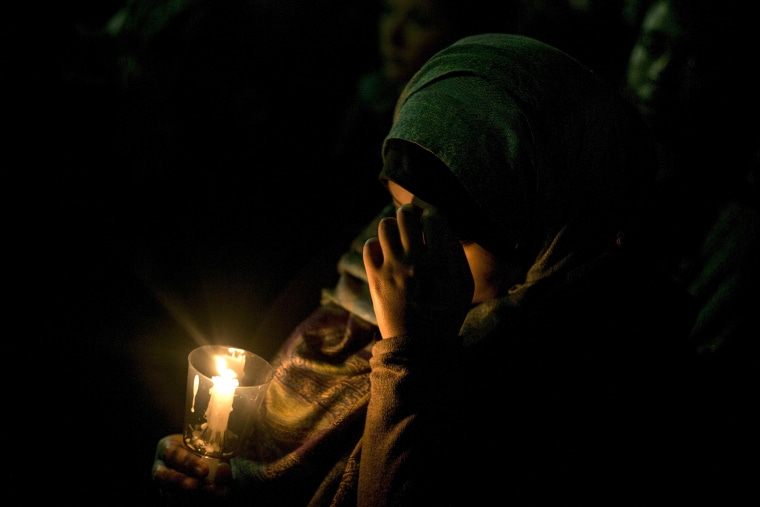CHAPEL HILL, North Carolina -- More than a thousand students, faculty and members of the community gathered for a vigil in this university town on Wednesday evening to remember and pay tribute to the three young Muslim-Americans who were shot dead in an apartment complex near the campus the day before.
Holding candles as they stood in a sunken courtyard known as “The Pit,” many tried to make sense of the killings of Deah Barakat, 23, his new wife, Yusor Abu-Salha, 21, and her sister Razan Abu-Salha, 19. A slideshow ran of happier times -- smiling faces, the couple’s wedding, a basketball game, a hike near a waterfall.

“I’m just in disbelief,” said Serene Ahmad, an 18-year-old family friend of the victims. “I just lost three of the best people I’ve met. Every time you saw them, you’d never feel remorse or pain. They’d bring a special light into the room.”
Craig Stephen Hicks, 46, of Chapel Hill has been charged with three counts of first-degree murder and is in police custody. Authorities said on Tuesday that a preliminary investigation into the deaths suggested the killings may have been the result of a simmering parking dispute but have not ruled out the possibility that it may have also been hate motivated.
RELATED: Man charged with murder of three people near UNC
Barakat, a second-year student at UNC-Chapel Hill’s School of Dentistry, had married Abu-Salha in December. The new bride had planned to start her dental studies at the same school this fall while younger sister Razan was an undergraduate at the nearby North Carolina State University studying architecture, according to authorities and school officials. Barakat had been fundraising for a trip this summer to Turkey, where he was going to provide dental care to Syrian refugees. After his death, many took to his fundraising page to donate and to express sympathy.
The shootings have sparked concern that Barakat and the Abu-Salha sisters were targeted because they were Muslim, with the hashtag #MuslimLivesMatter going viral after the news of the killings surfaced. Hicks, on his Facebook page, had a history of posting anti-religious articles and photos.
When asked if he thought the deaths stemmed from race, Barakat’s older brother, Farris, 24, told msnbc before the vigil, “I think so. My family thinks so.”
He recounted how Yusor Abu-Salha was afraid of Hicks and that he frequently came to the door to complain about noise or guests using too many parking spots. “She was afraid of him, uncomfortable, threatened,” Farris Barakat recounted. “He once came, opened up his jacket and showed his gun.”

The Council on American-Islamic Relations has urged officials to look into the possibility of an anti-Muslim motive as well. Nihad Awad, the organization’s national executive director called on state and federal enforcement authorities to “quickly address speculation of a possible bias motive in this case.”
Carol L. Folt, chancellor at UNC Chapel-Hill said that “such an act of violence goes against the very fiber of our community and society. It also creates a sense of vulnerability for all of us, especially members of the Muslim community.”
Imam Abdullah Antepli, a chief representative of Muslim Affairs and Adjunct Faculty of Islamic Studies at Duke University, said at the UNC campus that there is evidence suggesting the crime both did and did not have to do with race and that “for the safety and for the health of the investigation” people should refrain from jumping to conclusions.
Antepli did say, however, that tensions with Muslim-Americans has been at an all time high, given the current U.S. battle against the terrorist group known as ISIS. “This revealed the vulnerability of the Muslim community,” he said of the shooting, noting there are several hundred Muslim families in the Chapel Hill area, many who didn’t send their children to school on Wednesday. “There’s a sense of alienation, a sense of vulnerability I can’t describe.”